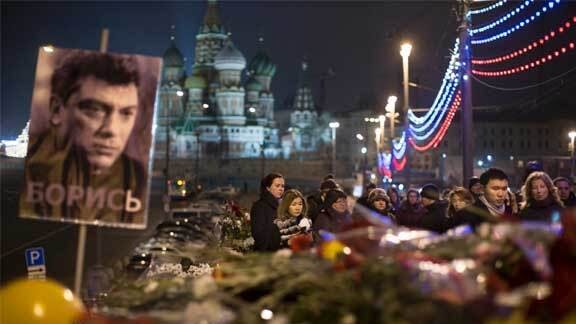Nemtsov murder a result of Putin’s tyranny

Boris Nemtsov was killed beneath the walls of the Kremlin, in Moscow, on 27 February, at 11.31 pm. He was shot four times in the back. This high-profile assassination, in the immediate vicinity of Russia’s citadel of power, has attracted world-wide attention – and condemnation.
It would have been the equivalent of a prominent opposition politician being brutally murdered outside Parliament House. The immediate conclusion of many, certainly not unjustified, is that he was murdered by president Vladimir Putin for opposing the regime.
Who was Nemtsov? Your average, right wing liberal politician.
He made his name as deputy prime minister under Boris Yeltsin in 1997, serving only slightly more than a year before an economic crisis discredited him and his fellow ministers.
The 1990s were dark years: economic collapse, mass privatisations and the impoverishment of the mass of the Russian people. Nemtsov was responsible, as were many of his government colleagues.
He was a hypocrite, promoting anti-corruption laws yet caught taking bribes.
But that was the 1990s. In the early 2000s, he fell out of favour. He criticised Putin for undermining democracy, even though Nemtsov also had contributed to the process.
He published dissident pamphlets about the corruption of Putin’s inner circle. His conclusions – Russia needed more free markets and a pro-Western orientation – were wholly inadequate. But he was now an outsider to the ruling elite, and he crossed the line when he publicly denounced Putin’s war in Ukraine.
For that he was mercilessly denounced by government propaganda. After his death, state TV station NTV quietly dropped a documentary it had been preparing, The anatomy of a protest, which was going to “investigate” Nemtsov as “the enemy of the people”. That was the context in which he was murdered.
Even if Putin didn’t order it, even if it had been done by the “power men” of the state – or the fighters of Chechnya’s collaborationist Kadyrov, or the well-looked-after groups of the Russian “anti-Maidan” – Putin and his government are fundamentally responsible for the murder.
The Nemtsov case is much more than the story of an oppositionist. It is illustrative of what Russian society under Putin has become. The political atmosphere is stifling. Hysterical denunciation of the government’s opponents is the norm. They are branded traitors, American spies and “fifth columnists”.
The war in Ukraine has become the focal point for censorship. Soldiers are lying in Russian hospitals, burned and crippled from battling the Ukrainian army. A steady flow of coffins is coming from Donetsk and Luhansk, to families who are told by the government that the Russian army is not involved in Ukraine.
Right wing and fascist goons patrol stadiums and train stations, carrying assault rifles and putting up posters in the middle of Moscow calling for volunteers to expand the Russian empire. Protesters are jailed, critical journalists are assassinated and vocal critics of the regime fear for their lives.
Seventy-year-old pensioners are reduced to stuffing their pockets with butter in the supermarket, and walking out with their heads low, because when their pension goes “up” from 12,000 to 15,000 rubles, it goes “up” from $320 to $180 a month. The currency has collapsed, the economy is unstable and only those with connections to the elite can afford anything more than the necessities, if even those.
There is one positive in all of this. The protests against the crisis and the government, which were planned before the murder and subsequently moved to the site of Nemtsov’s death in Moscow, were attended by tens of thousands. They allowed ordinary Russians to give expression to that dark and nameless feeling of fear, despair and outrage that so many feel but so few can articulate.
They galvanised anger against Putin, which has been simmering below the surface for years, occasionally breaking through as it did in 2011-2012 when huge numbers across Russia demonstrated against government corruption.
These protests are the only way forward, the way to stop more political murders and territorial expansions, and to fight for a decent society where workers can, for the first time in a very long time in Russia, have a decent and respected life.